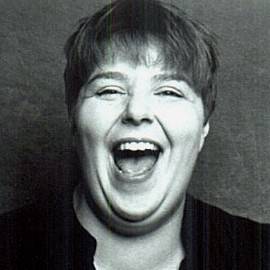“Karen Vacarro transforms herself into three radically different real women — a poet, a pianist and an actress — in this hilarious and poignant one-woman play about the lives of artists and the art of living as a woman in America,” which is interesting all by itself.
Performances will take place at the Independent Media Center, 202 South Broadway in Urbana on Friday August 6 (8PM), Saturday August 7 (8PM), and Sunday August 8 (7PM).
Tickets are $10 (Cash only). Advanced tickets can be purchased at Heartland Gallery, 112 West Main Street in Downtown Urbana between 10AM and 5PM Wednesday through Saturday. For more information, please call (217) 954-0231.
 Would you mind sharing with us what the play will be about and what has lead you to produce it?
Would you mind sharing with us what the play will be about and what has lead you to produce it?
The play is about three real women who live in Champaign-Urbana. Last fall, director Robert Quinlan and I received an Urbana Arts Council Grant to interview senior citizens and develop a play based on their lives. This is a full production of that play.
It looks like the central theme of the play revolves around the lives of three different women all of which are played by you. Can you please tell us briefly about some of the experience of trying to tackle three different roles at the same time? Is it hard? What did it take? And how drastically different are these characters?
Well, they are wonderful women, and it is a joy to play all three of them. I had the great opportunity to get to know them when we did the interviews, and was able to observe their mannerisms and listen to their speech patterns. During the show, I try to imagine that the audience are the people doing the interview. This makes the performance more of a dialogue than a monologue. It helps that the women are dramatically different. They see the world through very different lenses. Dorothy is a actress, Char’s a poet, and Mary Agnes is a pianist–and I think their choice of art says something about the way each see the world. Since the play has been developed, they have become friends (and even wrote a song together about the experience).
How would you describe the message of your play? It seems like the play touches on themes of gender. Would you mind commenting on the thought and the intention behind creating the “three radical women?”
We did not set out to create a play about women–we did also interview men. But when reviewing the material we had collected, these three women seemed to want to speak to each other. I do think of each of these women as pioneers in their own way…though I’m not sure they would label themselves as “radical”. As Dorothy says, none of them have “let the grass grow under their feet”. They each worked within their circumstances to foster creativity in others–through their art, teaching, and the way they raised their families. They are an inspiration to me.
Finally can you please share with us what you expect the audience to get out of your play?
I think the audience will have a great time! I also hope that people might be inspired to take some more time to listen to the stories of the older people in their lives. We are surrounded by (and related to) fascinating people with wells of personal experience and knowledge to relate. I’d like to think the show might inspire people to take that step–to engage in a dialogue.








